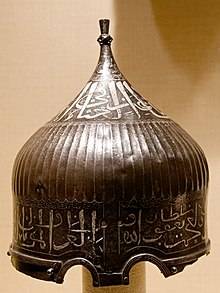Yaqub Aq Qoyunlu
| Ya'qub Beg | |||||
|---|---|---|---|---|---|
Sultan Khalil | |||||
| Successor | Baysunghur | ||||
| Died | 24 December 1490 Karabakh | ||||
| Spouse | Gawhar-Sultan Khanum | ||||
| Issue | Baysunghur Beg Murad Beg A daughter | ||||
| |||||
| Father | Uzun Hasan | ||||
| Mother | Seljuk Shah Khatun | ||||
| Religion | Sunni Islam | ||||
Yaqub b. Uzun Hasan
Origins
Yaqub Beg was the son of Uzun Hassan and Seljuk Shah Khatun. He had an older full-brother, Khalil Mirza Beg, and a younger full-brother, Yusuf Beg.[3][4] On 6 January 1478, his father died[5] and his brother Khalil proclaimed himself sultan. He exiled both of his brothers and killed his half-brother Maqsud Beg, son of Despina Khatun,[6] a Byzantine princess.[7][6][4][8][9] Another half-brother, Ughurlu Muhammad, son of Jan Khatun, escaped to Constantinople, to the court of the Ottoman Sultan Mehmed II, where he married his daughter Gevherhan Hatun.[10][11] This caused civil war to break out between Khalil and his family.[12][7][8][9] On 15 June 1478, Yaqub defeated his brother, executed him and proclaimed himself the new sultan.[7][8][9]
Reign

At the outset of his reign, Ya'qub faced a revolt from the Bayandur princes Alwand Beg and Kusa Haji in
Under Ya'qub, the realm remained the same size as that of his father, and the institutions of realm was strengthened. He retained the same ranks and land-grants that his subjects had received from his father. He did, however, launch a land reform in order to consolidate his realm, creating a stable government. The Aq Qoyunlu used a political system based on the old
The religious scholar and historian
Ya'qub became severely ill and died on 24 December 1490 in Karabakh. A number of scholars believe that he was poisoned by his wife.[13] The leading figures of the confederation installed his eight-year-old son Baysunghur on the throne to increase their own power. This marked the start of the decline of the Aq Qoyunlu.[13]
Imperial ideology

The Aq Qoyunlu displayed their legitimacy by rebuilding ruined
Family
Yaqub Beg had a consort, Gawhar-Sultan Khanum. They had two sons and a daughter:
- Baysunghur Beg
- Murad Beg
- A daughter, mother of Tajli Khanum and grandmother of Shah Tahmasp I.[18][8][19][20]
Poetry
Ya'qub's court included several distinguished poets, such as Baba Fighani Shirazi, Ahli Shirazi, Kamal al-Din Bana'i Haravi, and Shahidi Qumi. Another distinguished poet, Hatefi, who was a nephew of the poet Jami, spent five years at Ya'qub's court.[21] Khatai Tabrizi, an Azeri poet of the 15th century, dedicated a mathnawi entitled Yusof wa Zoleykha to Sultan Ya'qub,[22] and Ya'qub even wrote poetry in the Azerbaijani language.[22] Baba Fighani Shirazi dedicated a ceremonial ode (qasida) to Ya'qub, and also a eulogy after the latter's death.[23]
References
- ^ Sandra Aube Lorain (2015). "In search of 'Kamāl': Five Monumental Inscriptions from Yazd (second half of the 15th century)". Eurasian Studies (13): 69–91.
- ^ a b c d Quiring-Zoche 1986, pp. 163–168.
- ^ John E. Woods, The Aqquyunlu: Clan, Confederation, Empire (1999), p. 62
- ^ a b Minorsky, V.; Bosworth, C. E. (24 April 2012), "Uzun Ḥasan", Encyclopaedia of Islam, Second Edition, Brill, retrieved 10 February 2023
- OCLC 3168859.
- ^ JSTOR 1291371.
- ^ a b c Rezazadeh Langaroodi, Reza; Negahban, Translated by Farzin (16 October 2015), "Āq-qūyūnlū", Encyclopaedia Islamica, Brill, retrieved 10 February 2023
- ^ a b c d Foundation, Encyclopaedia Iranica. "Welcome to Encyclopaedia Iranica". iranicaonline.org. Retrieved 10 February 2023.
- ^ )
- )
- OCLC 316234394.
- ^ Murray, Hugh (1820). Historical Account of Discoveries and Travels in Asia: From the Earliest Ages to the Present Time. A. Constable and Company. p. 16.
- ^ a b c d e f g Langaroodi & Negahban 2015.
- ^ Pourjavady 2011, p. 11.
- ^ Dunietz 2015, pp. 34–35.
- ^ Minorsky 1955, p. 454.
- ^ Leube 2018, pp. 480–482.
- )
- OCLC 44966081.
- OCLC 5354386.
- ^ Lingwood 2013, p. 112.
- ^ a b Javadi & Burrill 2012.
- ^ Losensky 2020.
Sources
- Dunietz, Alexandra (2015). The Cosmic Perils of Qadi Ḥusayn Maybudī in Fifteenth-Century Iran. Brill. ISBN 978-9004302310.
- Langaroodi, Reza Rezazadeh; Negahban, Farzin (2015). "Āq-qūyūnlū". In ISSN 1875-9831.
- Leube, Georg (2018). "Aqquyunlu Turkmen Rulers Facing the Ruins of Takht-i Jamshīd" (PDF). Der Islam. 95 (2). De Gruyter: 479–506. S2CID 166087209.
- Lingwood, Chad (2013). Politics, Poetry, and Sufism in Medieval Iran: New Perspectives on Jāmī's Salāmān va Absāl. Brill. ISBN 978-9004254046.
- Losensky, Paul E. (2020). "Fighānī Shīrāzī, Bābā". In Fleet, Kate; ISSN 1873-9830.
- S2CID 154166838. (registration required)
- Javadi, H.; Burrill, K. (24 May 2012). "AZERBAIJAN x. Azeri Turkish Literature". Encyclopaedia Iranica.
- Pourjavady, Reza (2011). Philosophy in Early Safavid Iran. Brill. ISBN 978-9004191730.
- Quiring-Zoche, R. (1986). "Āq Qoyunlū". Encyclopædia Iranica, online edition, Vol. II, Fasc. 2. New York. pp. 163–168.
{{cite encyclopedia}}: CS1 maint: location missing publisher (link)
